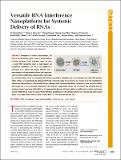Versatile RNA Interference Nanoplatform for Systemic Delivery of RNAs
Author(s)
Choi, Ki Young; Silvestre, Oscar F.; Huang, Xinglu; Min, Kyung Hyun; Howard, Gregory P.; Hida, Naoki; Jin, Albert J.; Carvajal, Nicole; Lee, Sang Wook; Hong, Jong-In; Chen, Xiaoyuan; ... Show more Show less
DownloadChoi-2014-Versatile RNA.pdf (6.410Mb)
PUBLISHER_POLICY
Publisher Policy
Article is made available in accordance with the publisher's policy and may be subject to US copyright law. Please refer to the publisher's site for terms of use.
Terms of use
Metadata
Show full item recordAbstract
Development of nontoxic, tumor-targetable, and potent in vivo RNA delivery systems remains an arduous challenge for clinical application of RNAi therapeutics. Herein, we report a versatile RNAi nanoplatform based on tumor-targeted and pH-responsive nanoformulas (NFs). The NF was engineered by combination of an artificial RNA receptor, Zn(II)-DPA, with a tumor-targetable and drug-loadable hyaluronic acid nanoparticle, which was further modified with a calcium phosphate (CaP) coating by in situ mineralization. The NF can encapsulate small-molecule drugs within its hydrophobic inner core and strongly secure various RNA molecules (siRNAs, miRNAs, and oligonucleotides) by utilizing Zn(II)-DPA and a robust CaP coating. We substantiated the versatility of the RNAi nanoplatform by demonstrating effective delivery of siRNA and miRNA for gene silencing or miRNA replacement into different human types of cancer cells in vitro and into tumor-bearing mice in vivo by intravenous administration. The therapeutic potential of NFs coloaded with an anticancer drug doxorubicin (Dox) and multidrug resistance 1 gene target siRNA (siMDR) was also demonstrated in this study. NFs loaded with Dox and siMDR could successfully sensitize drug-resistant OVCAR8/ADR cells to Dox and suppress OVCAR8/ADR tumor cell proliferation in vitro and tumor growth in vivo. This gene/drug delivery system appears to be a highly effective nonviral method to deliver chemo- and RNAi therapeutics into host cells.
Date issued
2014-04Department
Massachusetts Institute of Technology. Department of Chemical Engineering; Koch Institute for Integrative Cancer Research at MITJournal
ACS Nano
Publisher
American Chemical Society (ACS)
Citation
Choi, Ki Young, Oscar F. Silvestre, Xinglu Huang, Kyung Hyun Min, Gregory P. Howard, Naoki Hida, Albert J. Jin, et al. “Versatile RNA Interference Nanoplatform for Systemic Delivery of RNAs.” ACS Nano 8, no. 5 (May 27, 2014): 4559–4570. © 2014 American Chemical Society
Version: Final published version
ISSN
1936-0851
1936-086X